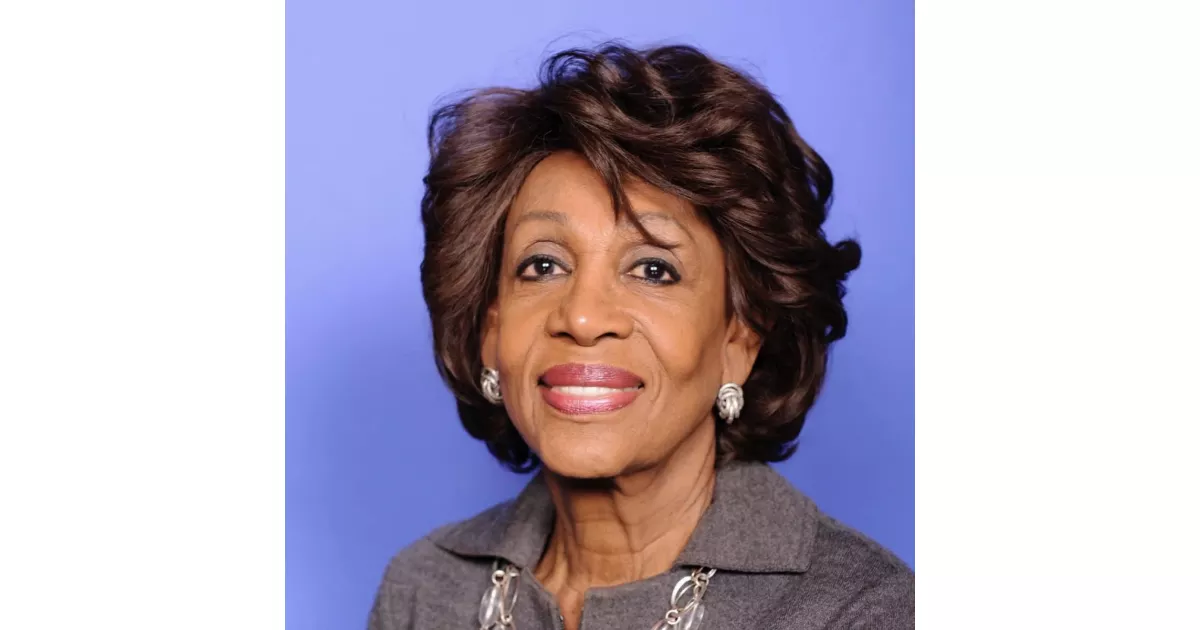Maxine Waters is an American politician who has served as the U.S. representative for California's 43rd congressional district since 1991. Her district, previously numbered as the 29th and 35th, encompasses much of southern Los Angeles and parts of Gardena, Inglewood, and Torrance. She is known for her outspoken nature and progressive political views, advocating for social justice and economic equality.
August 15, 1938: Maxine Waters Born
On August 15, 1938, Maxine Moore Waters, born Maxine Carr, was born in St. Louis, Missouri.
1966: Hired as Assistant Teacher
In 1966, Maxine Waters was hired as an assistant teacher with the Head Start program in Watts.
1971: Received Bachelor's Degree
In 1971, Maxine Waters received a bachelor's degree in sociology from Los Angeles State College, now California State University, Los Angeles.
1973: Chief deputy to City Councilman
In 1973, Maxine Waters began working as chief deputy to City Councilman David S. Cunningham Jr.
1976: Elected to California State Assembly
In 1976, Maxine Waters was elected to the California State Assembly.
1990: Elected to U.S. House of Representatives
In 1990, Maxine Waters was elected to the United States House of Representatives for California's 29th congressional district.
1991: Elected to U.S. House of Representatives
In 1991, Maxine Waters began serving as the U.S. Representative for California's 43rd congressional district, initially numbered as the 29th district.
July 1992: Waters Calls Bush a Racist
In July 1992, Maxine Waters called President George H. W. Bush "a racist" who "polarized the races in this country". She had previously suggested Bush used race to advance his policies.
1992: California's 29th district renumbered
In 1992, Maxine Waters' congressional district, the 29th, was renumbered as the 35th district.
1992: Waters' response to Rodney King verdict and LA riots
In 1992, following the Rodney King verdict, south-central Los Angeles erupted in riots. Maxine Waters gained national attention for leading a chant of "No justice, no peace" at a rally. She also helped deliver relief supplies and demanded vital services be resumed. Waters described the riots as a rebellion and a reaction to injustice.
1993: California's 29th district renumbered
In 1993, California's 29th congressional district, where Maxine Waters was representative, was renumbered as the 35th district.
July 29, 1994: Suspended from House for Unruly Behavior
On July 29, 1994, Maxine Waters was suspended from the House for the rest of the day due to unruly and turbulent behavior during a speech by Representative Peter King. Her actions were prompted by King's questioning of Maggie Williams the previous day during a House Banking Committee hearing on the Whitewater controversy.
1996: Called for Investigation into CIA Complicity
In 1996, following a San Jose Mercury News article, Maxine Waters called for an investigation into the alleged complicity of the Central Intelligence Agency (CIA) in the Los Angeles crack epidemic of the 1980s.
1997: Chaired Congressional Black Caucus
In 1997, Maxine Waters began her term as chair of the Congressional Black Caucus.
1998: Chaired Congressional Black Caucus
In 1998, Maxine Waters continued her term as chair of the Congressional Black Caucus.
1998: Waters Writes Letter to Castro Praising Policy Proposals
In 1998, Maxine Waters wrote Fidel Castro a letter, praising some of his policy proposals and thanking him for helping those who needed to "flee political persecution". She also criticized previous U.S. efforts to overthrow the Castro regime and called for an end to the U.S. trade embargo.
1998: Waters Asks Castro Not to Extradite Assata Shakur
In 1998, Maxine Waters wrote an open letter to Fidel Castro, requesting that he not extradite convicted terrorist Assata Shakur from Cuba. Waters argued that the Black community viewed Shakur's conviction as false.
1999: Waters Calls on Clinton to Return Elián González to Cuba
In 1999, Maxine Waters called on President Bill Clinton to return six-year-old Elián González to his father in Cuba. González had survived a boat journey from Cuba, during which his mother drowned, and had been taken in by U.S. relatives.
1999: End of term as chair of Congressional Black Caucus
In 1999, Maxine Waters' term as chair of the Congressional Black Caucus came to an end.
2000: Objected to Florida's Electoral Votes
In 2000, Maxine Waters and other House members objected to Florida's electoral votes, which George W. Bush narrowly won; however, the objection was dismissed by Vice President Al Gore.
2002: Waters Voted Against Iraq War Resolution
In 2002, Maxine Waters voted against the Iraq War Resolution, which funded and approved potential military action against Saddam Hussein's regime.
2004: Los Angeles Times Report on Relatives' Business
In 2004, Chuck Neubauer and Ted Rohrlich of the Los Angeles Times reported that Maxine Waters's relatives had earned over $1 million in the preceding eight years through business dealings with entities she had assisted.
2004: Death of Gary Webb
In 2004, Gary Webb, the author of the San Jose Mercury News article that alleged CIA complicity in the Los Angeles crack epidemic, was found dead. His death was declared a suicide.
2004: Waters Opposes Coup in Haiti and Meets with Aristide
In 2004, Maxine Waters opposed the coup d'état in Haiti and criticized U.S. involvement. After the coup, she joined a delegation to meet with Haitian President Jean-Bertrand Aristide and bring him to Jamaica.
2004: Voted Not to Count Ohio's Electoral Votes
In 2004, Maxine Waters was one of 31 House Democrats who voted not to count Ohio's electoral votes in the presidential election, which President George W. Bush won.
2005: Named as Corrupt Member of Congress
In 2005, Citizens for Responsibility and Ethics in Washington named Maxine Waters to its list of corrupt members of Congress.
2005: Secret meeting with Louis Farrakhan
In 2005, Maxine Waters secretly met with Louis Farrakhan.
2005: Testified on For-Profit Education Fraud
In 2005, Maxine Waters testified at the U.S. House Committee on Education and the Workforce hearings on "Enforcement of Federal Anti-Fraud Laws in For-Profit Education", highlighting the American College of Medical Technology as a "problem school" in her district.
2006: Named as Corrupt Member of Congress
In 2006, Citizens for Responsibility and Ethics in Washington named Maxine Waters to its list of corrupt members of Congress.
2006: Involved in Debate over King Drew Medical Center
In 2006, Maxine Waters was involved in the debate over King Drew Medical Center, criticizing media coverage and requesting the FCC to deny a waiver for KTLA-TV's license renewal, which was owned by the Los Angeles Times.
2007: Waters criticizes Bush's handling of Iraq War
In 2007, Maxine Waters criticized President George W. Bush for requesting funds for the "occupation" in Iraq, arguing it was draining resources that could be used for universal health care or fully funding his "No Child Left Behind" education bill. She also suggested that economic need drove some U.S. service personnel to serve in Iraq.
January 2008: Endorsed Hillary Clinton for Democratic Nomination
In late January 2008, Maxine Waters endorsed Hillary Clinton for the Democratic Party's presidential nomination.
August 2008: Waters Introduces Stop VULTURE Funds Act
In August 2008, Maxine Waters introduced HR 6796, the Stop Very Unscrupulous Loan Transfers from Underprivileged countries from Rich Exploitive Funds Act (Stop VULTURE Funds Act). The bill aimed to limit the ability of investors in sovereign debt to use U.S. courts against defaulting countries, but it ultimately died in committee.
September 2008: Arranged Meetings for OneUnited Bank
In September 2008, Maxine Waters arranged meetings between U.S. Treasury Department officials and OneUnited Bank to allow the bank to plead for federal assistance.
2008: National Housing Trust Enacted
In 2008, the National Housing Trust, which was later a key part of Maxine Waters' Home Forward Act of 2014, was enacted but not yet funded.
June 2009: Named Porker of the Month
In June 2009, Citizens Against Government Waste named Maxine Waters the Porker of the Month due to her intention to obtain an earmark for the Maxine Waters Employment Preparation Center.
2009: Co-sponsored Reparations Bill
In 2009, Maxine Waters co-sponsored Representative John Conyers's bill calling for reparations for slavery to be paid to black Americans.
2009: Confrontation over Earmark
In 2009, Maxine Waters had a confrontation with Representative Dave Obey over an earmark in the United States House Committee on Appropriations for a public school employment training center in Los Angeles named after her.
2010: Charged with Ethics Violations
In 2010, the House Ethics Committee charged Maxine Waters with ethics violations related to her efforts to help OneUnited Bank receive federal aid.
August 2011: Waters criticizes Obama's support for the Black community
In August 2011, Maxine Waters criticized President Barack Obama for insufficient support of the Black community, citing the high African American unemployment rate. She mentioned that some African American members of Congress were hesitant to publicly pressure Obama.
August 20, 2011: Waters' Comments on the Tea Party
On August 20, 2011, at a town hall meeting, Maxine Waters criticized the Tea Party movement, saying, "the 'tea party' can go straight to Hell ... and I intend to help them get there."
October 2011: Public Dispute with Obama
In October 2011, Maxine Waters had a public dispute with President Obama. Waters argued that Obama focused more on swing voters in Iowa than on Black voters. In response, Obama urged Waters to "stop complaining" and work with him.
2011: Named as Corrupt Member of Congress
In 2011, Citizens for Responsibility and Ethics in Washington named Maxine Waters to its list of corrupt members of Congress.
2011: Voted Against National Defense Authorization Act
In 2011, Maxine Waters voted against the National Defense Authorization Act for Fiscal Year 2012 due to a controversial provision allowing indefinite detention without trial.
September 21, 2012: Cleared of Ethics Charges
On September 21, 2012, the House Ethics Committee completed a report clearing Maxine Waters of all ethics charges after nearly three years of investigation.
2012: Ranking Member of House Financial Services Committee
In 2012, Maxine Waters became the ranking member of the House Financial Services Committee upon Barney Frank's retirement.
2012: Voted Against National Defense Authorization Act
In 2012, Maxine Waters was still serving as U.S. representative
2012: California's 35th district renumbered
In 2012, Maxine Waters' congressional district, the 35th, was renumbered as the 43rd district.
July 24, 2013: Voted in Favor of Amendment 100
On July 24, 2013, Maxine Waters voted in favor of Amendment 100 in H.R. 2397 Department of Defense Appropriations Act of 2014, which aimed to limit the NSA's data collection activities.
2013: California's 35th district renumbered
In 2013, California's 35th congressional district, where Maxine Waters was representative, was renumbered as the 43rd district.
March 27, 2014: Introduced Home Forward Act of 2014
On March 27, 2014, Maxine Waters introduced a discussion draft of the Housing Opportunities Move the Economy Forward Act of 2014, known as the Home Forward Act of 2014.
2014: Voted in Favor of Amendment 100
In 2014, Maxine Waters was still serving as U.S. representative
2016: Objected to Wyoming's Electoral Votes
In 2016, Maxine Waters objected to Wyoming's electoral votes after the presidential election, but the objection was dismissed by Vice President Joe Biden.
2016: Accusations of Russian collusion in 2016 presidential election
In 2016, allegations of Russian collusion during the presidential election surfaced, which later contributed to Maxine Waters' call for impeachment of Donald Trump.
February 2017: Waters on Trump's possible impeachment
In February 2017, Maxine Waters stated that Donald Trump was "leading himself" to possible impeachment due to conflicts of interest and creating "chaos and division".
July 2017: Reclaiming My Time
In July 2017, during a House Financial Services Committee meeting, Maxine Waters questioned Secretary of the Treasury Steven Mnuchin, repeatedly using the phrase "reclaiming my time", which became a popular phrase on social media.
August 12, 2017: Waters Links Trump to Charlottesville Violence
On August 12, 2017, Maxine Waters linked Donald Trump to the violence at a white nationalist protest rally in Charlottesville, Virginia, stating that the White House "is now the White Supremacists' House."
September 2017: Waters' Eulogy at Dick Gregory's Funeral
In September 2017, during a eulogy at Dick Gregory's funeral, Maxine Waters stated she was "cleaning out the White House" and that Donald Trump would regret not being impeached.
October 2017: Waters Says Congress Has Enough Evidence for Impeachment
In October 2017, Maxine Waters said that the U.S. Congress had enough evidence to "be moving on impeachment" against Donald Trump, citing Russian collusion allegations and obstruction of justice.
2017: Most Recent Instance of Mace Being Employed for Disciplinary Purpose
As of 2017, the incident on July 29, 1994, where Maxine Waters was suspended from the House, was the most recent instance of the mace being employed for a disciplinary purpose.
2017: Waters' Comments on Trump and His Advisors
In 2017, Maxine Waters described Donald Trump as "a bully, an egotistical maniac, a liar" and "the most deplorable person I've ever met." She also referred to Trump's advisors with ties to Russia as "a bunch of scumbags" during an appearance on MSNBC's All In with Chris Hayes.
April 24, 2018: Waters Urges Trump to Resign
On April 24, 2018, at the Time 100 Gala, Maxine Waters urged Donald Trump to resign from office to avoid impeachment.
June 23, 2018: Waters Urges Harassment of Trump Officials
On June 23, 2018, Maxine Waters urged attendees at a rally in Los Angeles to harass Trump administration officials after Sarah Huckabee Sanders was denied service at a restaurant.
October 24, 2018: Pipe Bombs Sent to Waters' Offices
On October 24, 2018, packages containing pipe bombs were sent to two of Maxine Waters's offices. The packages were intercepted by the FBI and no one was injured. Similar packages were sent to other Democratic leaders and CNN.
2018: Included in Time's 100 Most Influential People
In 2018, Maxine Waters was included in Time magazine's list of the "100 Most Influential People".
2018: Waters' Response to Trump's State of the Union
In 2018, after Donald Trump's State of the Union address, Maxine Waters released a video criticizing what she saw as his racist viewpoint and actions, calling him "a dangerous, unprincipled, divisive, and shameful racist." Trump responded by calling her a "low-IQ individual."
2018: Called on to Resign Due to Farrakhan Connection
In early 2018, Maxine Waters was among the members of Congress the Republican Jewish Coalition called on to resign due to her connections with Nation of Islam leader Louis Farrakhan, who had drawn criticism for antisemitic remarks.
June 18, 2019: Waters Asks Facebook to Halt Libra Development
On June 18, 2019, Maxine Waters requested that Facebook halt its plans for the development and launch of Libra, a new cryptocurrency, citing a lack of regulatory framework and concerns about privacy, security, and trading risks.
December 18, 2019: Waters Votes for Trump's Impeachment
On December 18, 2019, Maxine Waters voted for both articles of impeachment against Donald Trump, calling him "the worst president in the history of the United States."
2019: Cesar Sayoc sentenced for mailing bombs
In 2019, Cesar Sayoc pleaded guilty and was sentenced to 20 years in prison for mailing pipe bombs to Maxine Waters and others.
2019: Chaired the House Financial Services Committee
In 2019, Maxine Waters became the chair of the House Financial Services Committee.
May 2020: Waters' Sister Dies of COVID-19
In May 2020, during the COVID-19 pandemic, Maxine Waters confirmed that her sister, Velma Moody, had died of the virus at the age of 86.
October 1, 2020: Waters Condemns Azerbaijan's Actions in Nagorno-Karabakh
On October 1, 2020, Maxine Waters co-signed a letter to Secretary of State Mike Pompeo that condemned Azerbaijan's offensive operations against the Armenian-populated enclave of Nagorno-Karabakh, denounced Turkey's role in the conflict, and called for an immediate ceasefire.
April 17, 2021: Waters Comments on Daunte Wright Protests and Chauvin Trial
On April 17, 2021, Maxine Waters' comments during protests over the killing of Daunte Wright in Brooklyn Center, Minnesota, drew controversy. She expressed hope for a "guilty, guilty, guilty" verdict in the Derek Chauvin trial and suggested protesters should "stay on the street" and "get more active" if the verdict was not as desired.
April 19, 2021: Judge Criticizes Waters' Comments in Chauvin Trial
On April 19, 2021, the judge in Derek Chauvin's trial criticized Maxine Waters' comments as "abhorrent" and "disrespectful to the rule of law." The judge denied the defense's request for a mistrial but suggested Waters' comments could be grounds for appeal.
2023: Ranking Member of the House Financial Services Committee
In 2023, Maxine Waters became the ranking member of the House Financial Services Committee.
2023: Value of $1 million in 2004 Adjusted for Inflation
In 2023, the $1 million that Maxine Waters's relatives had made as of 2004 was equivalent to approximately $1.55 million when adjusted for inflation.
Mentioned in this timeline

Donald John Trump is an American politician media personality and...

Bill Clinton the nd U S President - served as...

Barack Obama the th U S President - was the...
Facebook is a social media and networking service created in...

Hillary Diane Rodham Clinton is an American politician lawyer and...

George W Bush the rd U S President - is...
Trending

4 months ago Castellanos on Red October, Harper Responds to Boos During MLB Playoffs.

7 months ago Blake Lively's Legal Battles: Deposition Postponed, Case Dismissed, Relief Granted in Baldoni Dispute

2 months ago Slotkin criticizes Hegseth's comments on military orders, raising concerns about legality and consequences.
2 months ago Strategy's Dollar Reserve for Bitcoin Fails Amidst Sales Concern and Market Slump

9 months ago Nebraska family of four dies in apparent murder-suicide on graduation day.

4 months ago Zayn Malik and Blackpink's Jisoo collaborate on 'Eyes Closed' single and music video.
Popular

Kid Rock born Robert James Ritchie is an American musician...
The Winter Olympic Games a major international multi-sport event held...

Barack Obama the th U S President - was the...

XXXTentacion born Jahseh Dwayne Ricardo Onfroy was a controversial yet...

Michael Joseph Jackson the King of Pop was a highly...

KFC or Kentucky Fried Chicken is an American fast-food chain...
